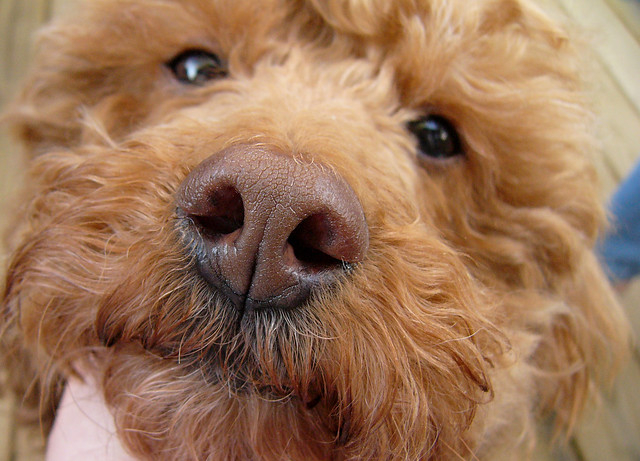 |
| Photo by Kathleen Tyler Conklin |
The Cockapoo was developed by crossing the American Cocker Spaniel and the Miniature Poodle. This breed is originally from the United States where they were bred during the 1960s. The first dogs were from accidental mating, but lately, as their popularity has continued to grow, the matings have become deliberate. Like the Poodle, the Cockapoo is an intent spectator, not going to the hyper extremes of many American Cocker Spaniels.
Temperament
In general, the Cockapoo is affectionate with a laidback nature. Although they are alert, they also have a very sweet nature. The Cockapoo is a very energetic and sociable dog that is very eager to please its owner. This breed makes wonderful companion dogs, and will get along well with children and when under supervision. It is vital for the Cockapoo to be trained from puppyhood onwards; otherwise, they might struggle with anger later on in their lives. These dogs will get jealous if their owners pay attention to other animals and people. The Cockapoo is very trainable, and also a very intelligent dog. These dogs are the perfect companion pet as they are smart, trustworthy, and easy to care for.
is affectionate with a laidback nature. Although they are alert, they also have a very sweet nature. The Cockapoo is a very energetic and sociable dog that is very eager to please its owner. This breed makes wonderful companion dogs, and will get along well with children and when under supervision. It is vital for the Cockapoo to be trained from puppyhood onwards; otherwise, they might struggle with anger later on in their lives. These dogs will get jealous if their owners pay attention to other animals and people. The Cockapoo is very trainable, and also a very intelligent dog. These dogs are the perfect companion pet as they are smart, trustworthy, and easy to care for.
Care
The Cockapoo is a fairly high maintenance dog and should be brushed and combed on a daily basis. The Cockapoo does not shed too much, and if they are brushed often, they will even shed less. These dogs are therefore ideal for someone struggling with allergies. It is advised that the Cockapoo should be clipped at least once during the year.
is a fairly high maintenance dog and should be brushed and combed on a daily basis. The Cockapoo does not shed too much, and if they are brushed often, they will even shed less. These dogs are therefore ideal for someone struggling with allergies. It is advised that the Cockapoo should be clipped at least once during the year.
Training
Cockapoos are very clever dogs, and this can make the training of these dogs very easy. These dogs will do very well when it comes to obedience, and if the training is presented in the correct manner these dogs will do extremely well. Cockapoos should be handled in a firm manner - training, however, should be very consistent but also very gentle.
Health problems
Some Cockapoos are fairly healthy, and others are not. They have a potential risk of some health problems, and these include hip dysplasia, progressive retinal atrophy, epilepsy, allergies, skin and ear problems, Legg-Calve-Perthes, luxating patellas, hypothyroidism, cryptorchidism and gastric torsion. Like any dog, the chance of avoiding health problems is increased if the dog's ancestors and relatives are screened for genetic disease themselves.

No comments:
Post a Comment